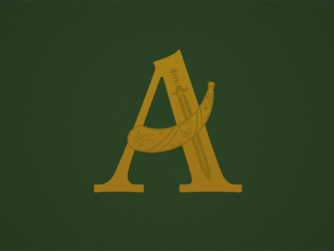The second half of “A Short Cut to Mushrooms” finds Frodo almost as scared of Farmer Maggot as he is of the Black Rider following him. His fears are quickly eased, however, and he finds a good friend in an unexpected place. We discuss the hospitality of hobbits (and their mistrust of outsiders), talk with our North Wing guest about the value of finding one’s tribe among the Tolkien community, and answer questions from Barliman’s Bag about Sauron’s tactical decisions. Also, how to make mushroom soup sound even less appetizing.
For more from Tom Hillman, this episode’s guest in The North Wing, please visit his blog Alas, not me (alasnotme.blogspot.com) for essays and insights on Tolkien, language and much more. Or pick up a copy of the recently released A Wilderness of Dragons: Essays in Honor of Verlyn Flieger edited by John D. Rateliff, which contains an essay co-authored by Tom entitled “Do Eldar Dream of Immortal Sheep?: Dreams, Memory, and Enchantment at the End of the Third Age.”
Recommended Reading:



Another reason Farmer Maggot may have ignored Sam was class. Sam was a servant.
As for maggot, it can have the meaning a fancy or a whim. It doesn’t seem to mean this given the treatment in Nomenclature, but that is always what came to my mind. You can find the term used like that in some English Country Dances, such as Jack’s Maggot or Mr. Beveridge’s Maggot.
Have fun at TexMoot. I was registered but had to change my plans. Maybe another time.
Excellent thought, David. One might assume that Maggot wouldn’t know Sam was a servant since they’ve never met before, but surely his clothes and his manner of speaking would have made his status very clear.
And I wasn’t aware of that meaning of “maggot”, but it is certainly interesting. Sorry to miss you at TexMoot, but hopefully at least one of us will make the next one!
In the podcast you noted that Mrs Maggot calls her husband by his last name even though she shares this. You then asked if this was a practice in the UK. It’s not now but it was common in the past. In Pride and Prejudice which was first published in 1813 Elizabeth Bennet’s parents only call each other “Mr Bennet” and “Mrs Bennet” – indeed we’re never told their first names. Likewise Elizabeth always calls her favourite (*) aunt “Aunt Gardiner” and never uses her first name. There are numerous other examples in the literature of the time. As Jane Austen’s characters came from the upper end of the social scale they would always add a title – e.g. “Mr”, “Aunt”. As the Maggot’s were lower down the social scale it was presumably acceptable to drop the honorific.
(*) The spelling is proof that I’m from the UK!
Thanks, Paul! We got a lot of feedback on my rather naïve question, and we will be revisiting it in an upcoming episode. All the best explanations I’ve seen reference Jane Austen, so I think you’re onto something.
what did he answer to favorite character?
Tom, that is, the northwing guest
Halbarad, of the Grey Company. Certainly not an answer I’ve heard often, but a great answer! If it hadn’t been the lightning round, we might have stopped to ask why. 🙂
Hey guys,
I started listening back in October and I’m slowly catching my way up! I listened to this episode a couple of weeks ago and I was interested in the discussion about Sauron’s inability to even conceive of anyone wanting to destroy the Ring.
On my last read through I picked up on an interesting blink-and-you-miss-it comment Gandalf makes in The Shadow of the Past:
‘And this is the dreadful chance, Frodo. He believed that the One had perished; that the Elves had destroyed it, as should have been done. But he knows now that it has not perished, that it has been found. So he is seeking it, seeking it, and all his thought is bent on it. It is his great hope and our great fear.’
This stood out to me because it suggests a rather interesting thing: it wasn’t clear that destroying the Ring would have an effect on Sauron. In fact, Sauron spent thousands of years thinking his Ring wasn’t just missing, but had been destroyed. Didn’t the fact that he had a potent, corporeal existence alert him to the fact that his horcrux was still in working condition?
He also thought the Elves had destroyed it—did he assume Elrond just tossed it into Orodruin, or did he think they knew (or could figure out) how to unmake it? Did he know how that might be achieved?
Assuming Gandalf’s understanding of Sauron’s thinking is accurate, it would seem Sauron didn’t have as much of an understanding of how the Ring worked as we might assume. It also suggests he might have known of alternate ways of destroying the thing, and perhaps the Elves should have spent a bit more time researching them.
As I say, I haven’t listened too much more than that, so you may have addressed this further already! Thanks for the great show!